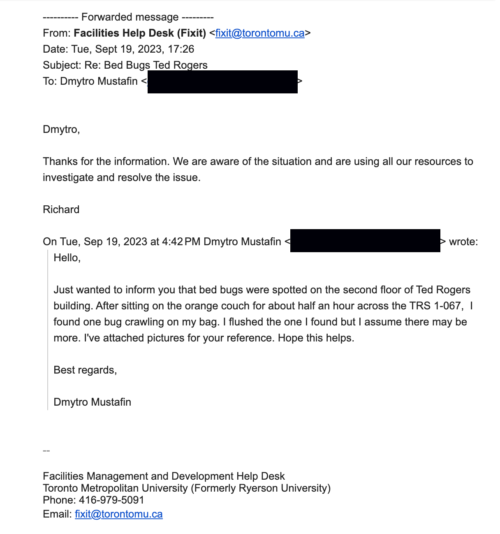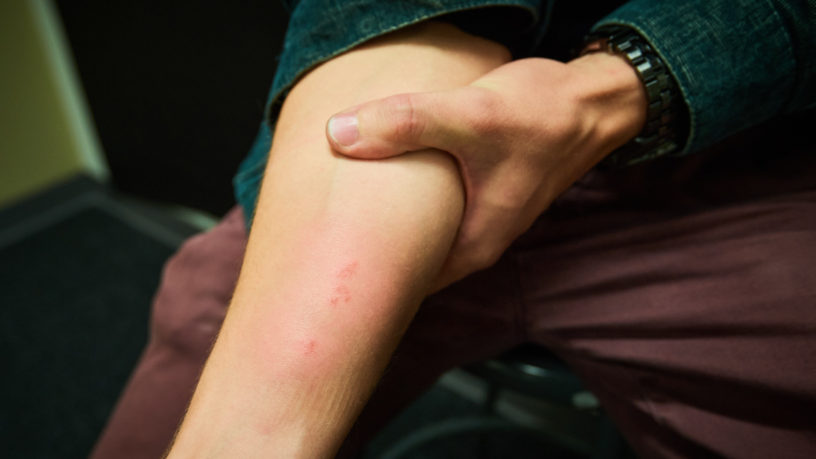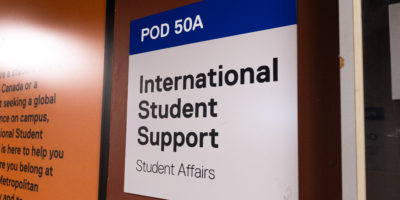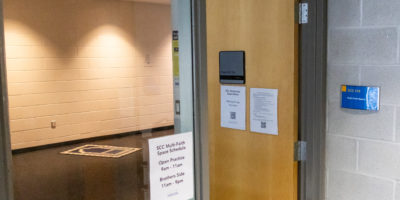By Anastasia Blosser and Gabriela Silva Ponte
A user under the name of u/MasterSantiago posted to their Reddit account about a bed bug found on their backpack strap at the Ted Rogers School of Management (TRSM) on Sept. 19.
The caption of the post to the r/TorontoMetU subreddit reads, “Avoid sitting on the orange seats across from TRS 1-067. Found this guy on my bag while waiting for class.”
Students can be found commenting below, urging the user to notify the school and agreeing over the poor condition of the chairs.
The alleged chairs, located on the seventh floor of the TRSM building at Toronto Metropolitan University (TMU), can be found across from the auditorium on the northeast corner.
First-year mechanical engineering student Dmytro Mustafin was the student behind the post. He said he was sitting in one of the chairs for approximately 30 minutes when his arm began to itch.
“Half an hour in, my arm started to itch. So I was thinking, ‘oh, you know, nothing much to it.’ Sometime afterwards, I actually noticed the guy crawling out on the edge of my sleeve so I panicked a little bit, shook it off and that’s how I got it on the bag,” he said in an in-person interview with The Eyeopener on Wednesday.
Mustafin endured a bite from the critter, which is pictured above. He added he wasn’t sure what it was initially, so he took the bug to the bathroom to inspect.
“[I] took a look at it with a camera and there it was, a good-ol-bed bug.”
TMU’s Facilities Management and Development said, “Bed bugs are a common and frustrating pest in Toronto and the university takes proactive measures in partnership with a pest-control specialist to try to prevent their spread in our buildings.”
“It’s important to remember that the presence of bed bugs is unrelated to cleanliness—bed bugs travel very easily, often on personal items such as backpacks,” they said in an statement emailed to The Eye on Sept. 20.
Mustafin said he drives to school, has never had a bed bug problem in his home and had one class in the George Vari Engineering and Computing Centre prior to finding the insect in TRSM. He said he’s certain it came from the chairs.
Despite finding the bed bug on campus, Mustafin says he doesn’t blame TMU. Rather, he believes it could be a side effect of the housing crisis.
“Maybe somebody could not afford a decent place so they had to get the cheapest one available…It could be in very bad condition with bed bugs, roaches, anything,” he said.
But, he also said he has heard it’s a recurring issue at the university.
“I actually have a couple of friends who graduated from here recently and when I told them about it, they said, ‘yeah, we’ve had it happen quite a few times,’” he said. “When they attended TMU, they heard about it in the Victoria Building.”
As previously reported by The Eye, TMU has received reports of bed bugs in past years and fumigated buildings to combat infestations.
Mustafin let facilities know about his incident and they emailed back saying they were already aware of the situation.

Facilities Management and Development confirmed they received the report and are carrying out an investigation and inspection.
“The protocol for response to a confirmed bed bug sighting is to cordon off the area and conduct a heat treatment, which is the most effective extermination measure against bed bugs. A canine unit inspection is conducted after the heat treatment to confirm the results. If the canine unit finding is all clear, no further action is required,” the department said in the email.
“It’s critical that community members contact the Facilities Help Desk (Fixit) right away with a photo if they suspect a bed bug has been spotted and details about the location, so we can identify the pest and address it. Reports can be submitted online through Facilities Service Requests Form or by contacting the Facilities Help Desk (fixit@torontomu.ca, 416-979-5091),” they added.
Bed bugs are scientifically known as Cimex lectularius and can feed off humans, though there is no evidence they transmit diseases. The “bed bug” name comes from their habit to feed on humans as they sleep.












Leave a Reply